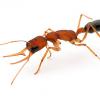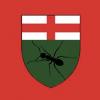- Formiculture.com
- Forums
- Gallery
- Members
- Member Map
- Chat

Finding exotic ant in green house plant stores
Started By
AdamL
, Dec 16 2019 12:35 PM
11 replies to this topic
#1
 Offline
-
Posted December 16 2019 - 12:35 PM
Offline
-
Posted December 16 2019 - 12:35 PM
So I have heard storys if people finding exotic queen ants inside of green house plant stores so is it possible and if I did would they survive Connecticuts climate.
#2
 Offline
-
Posted December 16 2019 - 1:00 PM
Offline
-
Posted December 16 2019 - 1:00 PM
That depends. If the queen was from a region where the native ants don't need to hibernate because of the climate, than she'll probably die in the winter. However, if the queen is from a similar region but not native to Connecticut, one should get rid of the queen immediately and under no circumstances keep her. If the queen can survive the winter, she'll likely start a thriving colony and the surrounding ecosystem would be in ruins, as her colony would outcompete native species. It would be helpful to know where the plant was shipped from, where it's native to, etc - so one could do some research on whatever queen they discovered.
#3
 Offline
-
Posted December 16 2019 - 1:02 PM
Offline
-
Posted December 16 2019 - 1:02 PM
If you find an exotic queen or colony in a greenhouse, by all means keep her/them, just don't EVER release her/them. They won't necessarily "ruin" the ecosystem. They may become native in the future.
- Antennal_Scrobe likes this
My Main Journal | My Neivamyrmex Journal | My Ant Adoption | My YouTube
Join the TennesseeAnts Discord Server! https://discord.gg/JbKwPgs
#4
 Offline
-
Posted December 16 2019 - 1:05 PM
Offline
-
Posted December 16 2019 - 1:05 PM
I guess that makes sense; after all, keeping the colony in captivity would mean that the species probably won't proliferate in the wild.
#5
 Offline
-
Posted December 16 2019 - 1:06 PM
Offline
-
Posted December 16 2019 - 1:06 PM
I should have mentioned: It also depends on what species/genus the ant is. If it's something like Trychomyrmex, or Solenopsis, it could pose a threat to the ecosystem.
Edited by Ant_Dude2908, December 16 2019 - 1:07 PM.
- Antennal_Scrobe likes this
My Main Journal | My Neivamyrmex Journal | My Ant Adoption | My YouTube
Join the TennesseeAnts Discord Server! https://discord.gg/JbKwPgs
#6
 Offline
-
Posted December 16 2019 - 1:15 PM
Offline
-
Posted December 16 2019 - 1:15 PM
Ok because I would like to go to one of those plant green houses and find something exotic but I would never ever realease them/her
- TennesseeAnts likes this
#7
 Offline
-
Posted December 16 2019 - 2:56 PM
Offline
-
Posted December 16 2019 - 2:56 PM
If you find an exotic queen or colony in a greenhouse, by all means keep her/them, just don't EVER release her/them. They won't necessarily "ruin" the ecosystem. They may become native in the future.
Have we really determined when an invasive species becomes 'native'? I mean, all species must have settled in a region at some point or another, making all species invasive to most regions. Where's the line? What do the terms even mean, really?
"God made..... all the creatures that move along the ground according to their kinds (including ants). And God saw that it was good. Genesis 1:25 NIV version
Keeping:
Formica cf. pallidefulva, cf. incerta, cf. argentea
Formica cf. aserva, cf. subintegra
Myrmica sp.
Lasius neoniger, brevicornis
#8
 Offline
-
Posted December 16 2019 - 3:17 PM
Offline
-
Posted December 16 2019 - 3:17 PM
I've caught tapinoma melanocephalum and tetramorium bicarinatum in a greenhouse before.
My journals:
Polyergus Mexicanus: https://www.formicul...gs/#entry175528
Lasius minutus: https://www.formicul...cs/#entry174811
Lasius latipes: https://www.formicul...gs/#entry206449
General acanthomyops journal: https://www.formicul...yops-with-eggs/
Polyergus Mexicanus: https://www.formicul...gs/#entry175528
Lasius minutus: https://www.formicul...cs/#entry174811
Lasius latipes: https://www.formicul...gs/#entry206449
General acanthomyops journal: https://www.formicul...yops-with-eggs/
#9
 Offline
-
Posted December 16 2019 - 3:22 PM
Offline
-
Posted December 16 2019 - 3:22 PM
If you find an exotic queen or colony in a greenhouse, by all means keep her/them, just don't EVER release her/them. They won't necessarily "ruin" the ecosystem. They may become native in the future.
Have we really determined when an invasive species becomes 'native'? I mean, all species must have settled in a region at some point or another, making all species invasive to most regions. Where's the line? What do the terms even mean, really?
I guess a species becomes "native" when it has established equillibirum with the ecosystem (as in, it has enough predators to keep its population in check, it doesn't displace previously native species, it finds a specific niche, etc...)
#10
 Offline
-
Posted December 16 2019 - 3:30 PM
Offline
-
Posted December 16 2019 - 3:30 PM
If they don't completely level the ecosystems they invade until there's no equilibrium left (like the ant who's name we shall not speak).
"God made..... all the creatures that move along the ground according to their kinds (including ants). And God saw that it was good. Genesis 1:25 NIV version
Keeping:
Formica cf. pallidefulva, cf. incerta, cf. argentea
Formica cf. aserva, cf. subintegra
Myrmica sp.
Lasius neoniger, brevicornis
#11
 Offline
-
Posted December 16 2019 - 3:46 PM
Offline
-
Posted December 16 2019 - 3:46 PM
If you find an exotic queen or colony in a greenhouse, by all means keep her/them, just don't EVER release her/them. They won't necessarily "ruin" the ecosystem. They may become native in the future.
Uhhh although they become established they will never become native in the future. It would be considered a naturalized exotic species.
Edited by gcsnelling, December 16 2019 - 3:48 PM.
- TennesseeAnts likes this
#12
 Offline
-
Posted December 16 2019 - 4:01 PM
Offline
-
Posted December 16 2019 - 4:01 PM
I meant naturalized....
My Main Journal | My Neivamyrmex Journal | My Ant Adoption | My YouTube
Join the TennesseeAnts Discord Server! https://discord.gg/JbKwPgs
1 user(s) are reading this topic
0 members, 1 guests, 0 anonymous users

















